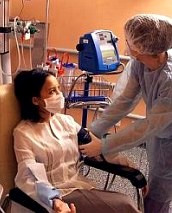 Management
of end-stage renal disease is tough irrespective of the cause, but it's
doubly so when diabetes complicates things. Mrs. Six-Killer is very close to
needing dialysis. Management
of end-stage renal disease is tough irrespective of the cause, but it's
doubly so when diabetes complicates things. Mrs. Six-Killer is very close to
needing dialysis.
Our goals in addition providing renal replacement with dialysis
(there is no hope of restoring her kidneys to health).
- Restore and maintain electrolyte
balance, correct acidosis and her anemia.
- Target hematocrit is 33-36%
- Minimize catabolism, avoid negative
nitrogen balance.
- Control her blood pressure (ideally
125/75).
- Improve her diabetes control with HgA1c
<7%.
Nutritional recommendations:
remember we are dealing with the inability to excrete some things as well
as protein loss and carbohydrate intolerance.
- Energy intake should be figured as
35/kcal/kg/day for patients under 60, and 30-35/kcal/kg/day for those over
60.
- Protein is necessary and daily intake is
figured at a maximum of 0.6 grams/kg/day.
- Depending on the degree of edema, Na+
and phosphate restriction may be indicated.
- Fluid intake has to be closely watched.
Intake should match output , plus what is called insensible loss (that
is water you lose through the skin and breath). In other words, add
about 500-1000 cc to the daily output.
- Some vitamins will build up to toxic
levels. May need to restrict intake of
- May need to supplement
- B6, folic acid and vitamins C and D
(remember with the kidney's role with D?)
Next is an elderly man with what he calls
the 'dwindles'. |